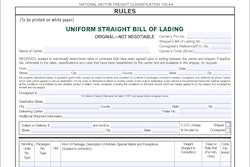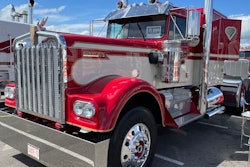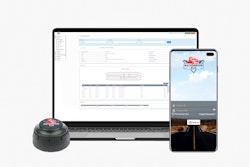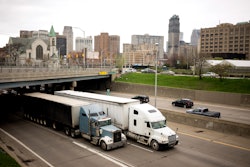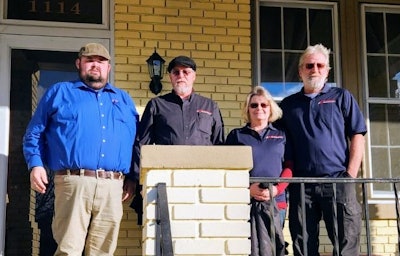
It was an eventful week on Capitol Hill in Washington, D.C., last week, and not just for emphasis placed on a variety of trucking issues before the first meeting of the House Transportation and Infrastructure Committee.
Four operators regular readers may well be familiar with were in town as founding council members of a new organization, CDL Drivers Unlimited (CDLDU), a for-profit alliance borne in part out of advocates' frustration with grassroots efforts going back almost a decade. (Membership in the organization is possible now for CDL holders at $15/month or $150/year.)
Generally speaking, the alliance is intended to support and advocate for "the quarterback of the delivery team," the driver, in the words of David Heffernan, one of two Heffernan brothers (Jim is the other) funding the effort and who worked with founding council member drivers to get the group off the ground over the course of the last years.
Any quarterback is supposed to be able to lead the team to the win, as David Heffernan put it. When it comes to advocacy on Capitol Hill, when it comes to back-office support for owner-operators and small fleets, to training certifications, to fuel price discounts and other ways to rein in costs, CDL Drivers Unlimited hopes to build a community to support operators in doing just that.

Two of the founding council members are Lee and Lisa Schmitt, who last year requested an exemption from parts of the hours of service in an effort in part to spur further conversation about the potential for greater flexibility for experienced operators. Lee Schmitt is serving as leader of the CDLDU Driver's Rights committee, and noted the trip to D.C. last week was the organization's initial push toward building on relationships with legislators and regulators.
He calls back to something he and Lisa, among others, were told by Texas Sen. Ted Cruz's office back in 2018. "What he wanted then," Schmitt said, namely a coherent, organized group with an established constituency of CDL drivers: "well here it is, a grassroots group coming together."
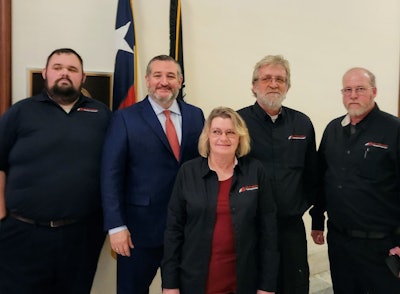 The four met with Cruz as just one of a bevy of introductory meetings last week.
The four met with Cruz as just one of a bevy of introductory meetings last week.
The central message had less to do with particular issues of concern than to convey the message that CDLDU and the drivers it represents "are stakeholders," said Lee. Drivers, he added, "are the largest segment in the industry, and we are stakeholders. .... We are here to give you a different viewpoint on things. Today’s not an issues day, today’s a day to introduce you to our alliance."
It all marked the beginning of what the group hopes will be ongoing conversations with the aim of presenting working solutions to problems. "We need drivers to come together," said Lisa, along with their direct-support systems in terms of family, friends, colleagues.
A companion website, CDL Drivers & Friends, is a free-membership site for those supporters, with a variety of resources and information to promote the interests of professionals across trucking and transportation more broadly.
"When this thing is in full swing," Lisa said, resources for paid members will touch on back-office accounting and dispatch, fuel discounts/management, other purchase discounts at a variety of outlets, insurance, quality of life/medical, and more. "Everything that drivers need will be there."
[Related: How does the public view truckers in 2022?]
The Heffernans are building those resources with a variety of partners around the nation, hoping to aggregate the buying power of a large group of members to deliver savings on products and services in a manner similar to other groups and associations, and large-fleet employers.
CDLDU notes there's something for owner-operators, for drivers, for bus drivers and local operators, too.
Any CDL holder could stand to benefit, Lisa added.
"We realize there are things in our alliance that can be done to improve our industry from the inside." --Lisa Schmitt, on one among many points emphasized with legislators/regulators in last week's meetings
Fellow founding CDLDU council member John Grosvenor brings that local-trucking perspective to the organization's leadership council, for instance. He hauls today in a dump operation in and around Boston, greater Massachusetts and New Hampshire. Grosvenor views CDLDU as "an alliance," fundamentally, of formerly disparate grassroots groups and individuals with an interest in improving conditions for CDL holders of all stripes. Like the Schmitts, Grosvenor was involved with 2017 efforts to protest implementation of the electronic logging device mandate, an energizing event for him and many others when it comes to advocacy efforts.
Over time, the energy has dissipated, he felt. With CDLDU, he hoped, "the more people that collaborate, the stronger we become. Through the years" since those 2017 efforts, various groups have "all done our own thing. By coming together as one ... I'm hoping we can bring the fire back up" to deliver solutions.
With the parallel CDL-holder paid membership combined with CDL Drivers & Friends support members, he feels the organization has a chance to be able to go to regulators and legislators representing a community as many as 150K CDL holders and many multiples of that number of supporters. "150,000 CDL members could lead to 750,000 others," he offered as an example.
In Washington, D.C., last week, Grosvenor said he felt real engagement from legislative offices the group managed to sit down and meet with -- 20 or so in all, said Lee, beating their overall goal of 13 going in.
[Related: 'Bringing the cultural diversity of trucking together': ELD protest outcomes]
"For the first time in any time of doing this sort of thing, I actually feel very confident about where this could go."
--Scott Reed
When they weren't in prescheduled meetings, said Lisa, the four visited as many individual Reps and Senators' offices as they could, presenting an introductory packet that, often enough, resulted in another sit-down on the spot or later.
"We showed them our issues book," she said. "The Table of Contents for that alone is two and a half pages long." Yet they emphasized that "we won’t bring all of our issues" to federal legislators and regulators, she added. "We realize there are things in our alliance that can be done to improve our industry from the inside -- from business management and crisis management, to health issues" and plenty more. "And some things have to go through to the states."
The Heffernans note they're committed to working through the process of registering council members, including the Schmitts, Grosvenor and Reed, as lobbyists at both federal and state levels, to make representation of the CDLDU constituency of drivers official -- representation, that is, by working operators themselves.
All four council members in D.C. have spent time away from the road in recent history, but all are currently hauling in some form or fashion, the Schmitts back leased with a reefer carrier in the Midwest after some time off last year awaiting results of their hours-exemption request. (And yes, they noted, they're still prepping another for resubmission after last year's denial by FMCSA. The agency denied it on grounds that Lee hadn't adequately demonstrated how he could achieve an equivalent level of safety under the hours of service rule if limited only by 11 daily hours of drive time.)
[Related: What if you didn't need 10 off after 11 or 14 in the HOS?]
After so many years individually engaged in advocacy efforts, said Reed, he'd give this D.C. trip "four out of five stars, if I was going to rate it that way. We had some very positive feedback. We had some really great meetings with really great Congressional people, I think, because we went together, we were as one, working as one."
FMCSA, he noted, offered encouragement to the group for its potential staying power, Reed added. "I think we could actually do something beneficial. For the first time in any time of doing this sort of thing, I actually feel very confident about where this could go. I feel really confident it could actually grow." That's something, looking back, he couldn’t say for a lot of past efforts.
Founding members and the Heffernans continue to build a leadership team with the goal of reaching a 40-member council. Lisa noted members can express interest in joining the leadership council via this page on the website.
[Related: Trucking advocacy, education: Getting started early]

